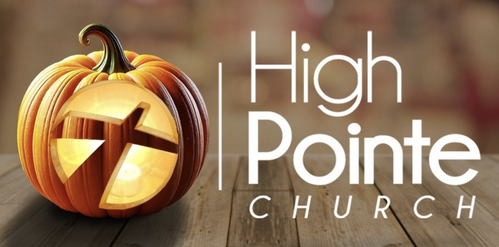A Light in the Dark: Shining His Light on Halloween
Don’t Run from the Darkness, Light It Up!
Romans 12:21 (NLT) Don’t let evil conquer you, but conquer evil by doing good.

Every year around this time, Christians start asking the same question: What do we do with Halloween? It’s a fair question. Our culture has turned this day into a celebration of fear, death, and darkness, which clearly do not reflect the heart of God.
But what if I told you Halloween did not start that way? What if, long before it became what it is today, it was actually a Christian observance?
But what if I told you Halloween did not start that way? What if, long before it became what it is today, it was actually a Christian observance?
The Real Origin of Halloween
The word “Halloween” comes from All Hallows’ Eve, the night before All Saints’ Day. In the early church, All Saints’ Day (also called All Hallows’ Day) was a time for believers to remember and honor faithful followers of Jesus who had gone before them. It was a day to celebrate those who lived courageously for the gospel and were now with the Lord.
“All Hallows’ Eve” was a night of reflection and preparation, a time to thank God for the victory of Christ over death and to celebrate the eternal life He gives His people.
As Christianity spread through regions that practiced pagan traditions, elements of local superstition, folklore, and harvest festivals began to blend into the observance. Over time, what was meant to honor Christ was replaced by practices that glorified fear and darkness.
But that is not where the story ends.
God Redeems What the Enemy Corrupts
Our faith is built on the power of redemption. The cross itself was once an instrument of death and shame, but Jesus transformed it into the greatest symbol of hope and life.
The early Christians did not run from the cross. They reclaimed it. They did not hide from the brokenness of their world. They entered it with the light of Christ.
Romans 12:21 says, “Do not let evil conquer you, but conquer evil by doing good.” That is what we strive to do as followers of Jesus. We do not hide from darkness. We shine light into it.
“All Hallows’ Eve” was a night of reflection and preparation, a time to thank God for the victory of Christ over death and to celebrate the eternal life He gives His people.
As Christianity spread through regions that practiced pagan traditions, elements of local superstition, folklore, and harvest festivals began to blend into the observance. Over time, what was meant to honor Christ was replaced by practices that glorified fear and darkness.
But that is not where the story ends.
God Redeems What the Enemy Corrupts
Our faith is built on the power of redemption. The cross itself was once an instrument of death and shame, but Jesus transformed it into the greatest symbol of hope and life.
The early Christians did not run from the cross. They reclaimed it. They did not hide from the brokenness of their world. They entered it with the light of Christ.
Romans 12:21 says, “Do not let evil conquer you, but conquer evil by doing good.” That is what we strive to do as followers of Jesus. We do not hide from darkness. We shine light into it.
Three Ways We Can Respond
When we face cultural issues like Halloween, Christians have three options:
1.Reject it – Turn away from what is evil and stay pure before God.
2.Replace it – Create something better that points people to Jesus.
3.Redeem it – Take what was meant for darkness and use it to bring light.
At High Pointe, we do not celebrate Halloween. We replace it.
On the Sunday before Halloween, we open our doors to the community. Families are invited to walk through the church and our youth building, meet our church family, get treats, and laughter, and experience the warmth of Christian fellowship.
There are no dark themes, evil imagery, or demonic costumes. Everything points to light, joy, and community. It is a safe, welcoming space that reflects the love of Christ in a time when fear and darkness seem to dominate.
It is one of the few nights each year when our community is out together. What better time to open our doors and introduce people to the hope of Jesus?
Engaging Culture the Way Paul Did
This approach is not new. The Apostle Paul did the same thing.
In Acts 17, Paul visited Athens, a city filled with idols and false gods. Instead of avoiding it, he engaged it. He stood before the people and said, “Men of Athens, I see that you are very religious… I even found an altar with this inscription: ‘To an unknown god.’ This God, whom you worship without knowing, is the one I’m telling you about!” (Acts 17:22–23 NLT).
Paul even quoted their poets and philosophers to connect with them. He did not compromise truth. He contextualized it. He met people where they were and pointed them to Jesus using what they already understood.
That is what it looks like to engage culture without becoming shaped by it.
Christians Have Done This Throughout History
The church has been redeeming and replacing cultural celebrations for centuries.
• Christmas: The early church placed the celebration of Christ’s birth during a time when pagan festivals honored the sun. Christians replaced it with a celebration of the true Light of the World.
• Easter: Ancient spring festivals celebrated fertility and new life. The church redirected that meaning toward the resurrection of Jesus, who brings eternal life.
• Sunday Worship: The day once used for sun worship became the day Christians honor the risen Son of God.
Redemption is in our spiritual DNA. We do not run from the world’s darkness. We bring the light of Christ into it.
The Light Still Shines
John 1:5 says, “The light shines in the darkness, and the darkness can never extinguish it.” That is why we do what we do.
When we open our doors, we are not participating in evil. We are confronting it. We are offering our community a place of safety, joy, and hope.
We are not celebrating Halloween. We are reclaiming it for Christ. The same God who turned a cross into a symbol of salvation can take one dark night on the calendar and use it to draw people to Himself.
This is what it means to be in the world but not of it. We do not hide from the world. We shine for Jesus in it!
When we face cultural issues like Halloween, Christians have three options:
1.Reject it – Turn away from what is evil and stay pure before God.
2.Replace it – Create something better that points people to Jesus.
3.Redeem it – Take what was meant for darkness and use it to bring light.
At High Pointe, we do not celebrate Halloween. We replace it.
On the Sunday before Halloween, we open our doors to the community. Families are invited to walk through the church and our youth building, meet our church family, get treats, and laughter, and experience the warmth of Christian fellowship.
There are no dark themes, evil imagery, or demonic costumes. Everything points to light, joy, and community. It is a safe, welcoming space that reflects the love of Christ in a time when fear and darkness seem to dominate.
It is one of the few nights each year when our community is out together. What better time to open our doors and introduce people to the hope of Jesus?
Engaging Culture the Way Paul Did
This approach is not new. The Apostle Paul did the same thing.
In Acts 17, Paul visited Athens, a city filled with idols and false gods. Instead of avoiding it, he engaged it. He stood before the people and said, “Men of Athens, I see that you are very religious… I even found an altar with this inscription: ‘To an unknown god.’ This God, whom you worship without knowing, is the one I’m telling you about!” (Acts 17:22–23 NLT).
Paul even quoted their poets and philosophers to connect with them. He did not compromise truth. He contextualized it. He met people where they were and pointed them to Jesus using what they already understood.
That is what it looks like to engage culture without becoming shaped by it.
Christians Have Done This Throughout History
The church has been redeeming and replacing cultural celebrations for centuries.
• Christmas: The early church placed the celebration of Christ’s birth during a time when pagan festivals honored the sun. Christians replaced it with a celebration of the true Light of the World.
• Easter: Ancient spring festivals celebrated fertility and new life. The church redirected that meaning toward the resurrection of Jesus, who brings eternal life.
• Sunday Worship: The day once used for sun worship became the day Christians honor the risen Son of God.
Redemption is in our spiritual DNA. We do not run from the world’s darkness. We bring the light of Christ into it.
The Light Still Shines
John 1:5 says, “The light shines in the darkness, and the darkness can never extinguish it.” That is why we do what we do.
When we open our doors, we are not participating in evil. We are confronting it. We are offering our community a place of safety, joy, and hope.
We are not celebrating Halloween. We are reclaiming it for Christ. The same God who turned a cross into a symbol of salvation can take one dark night on the calendar and use it to draw people to Himself.
This is what it means to be in the world but not of it. We do not hide from the world. We shine for Jesus in it!
Recent
Archive
2025
March
April
September
October
November
2024
September
October
November

No Comments